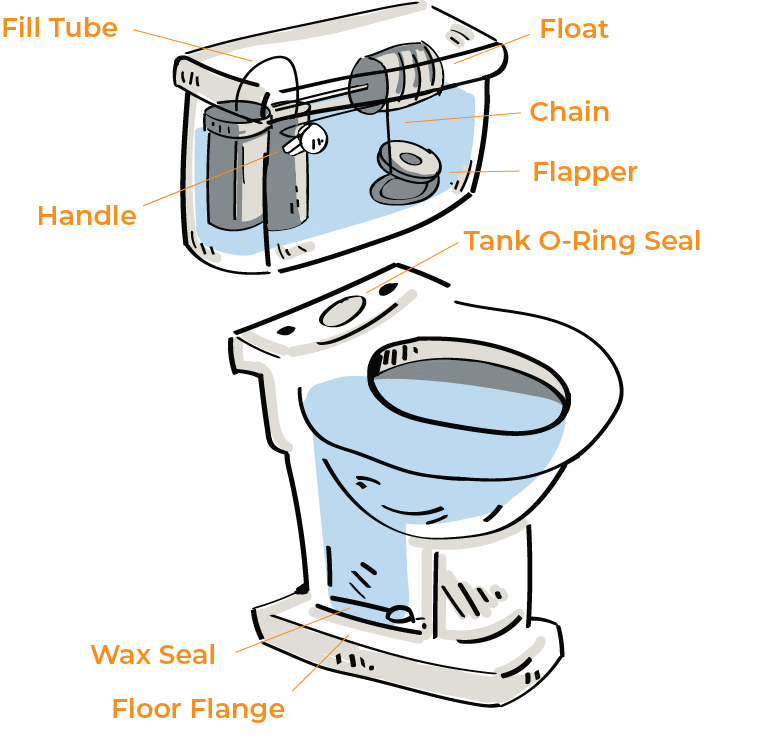Squeaking, creaking, whistling, and vibrating pipes can make you feel like you are living with ghosts – but most likely, it's nothing supernatural! The majority of these sounds can be attributed to your water pipes and can be fixed by either you or a Commercial Service technician.
Have a heating, cooling, or plumbing problem, but no time to wait for a repairman? Need a second opinion on an existing quote?
We’ll give you free advice about your question or problem. In many cases, you’ll get an estimate or the help you need during the video call.
 Noisy pipe enemy #1: the toilet
Noisy pipe enemy #1: the toilet
Sound can come from any appliance where water and air are present, like washing machines, sinks, and water heaters, but when it comes to noisy pipes, the biggest offender is usually the toilet. One of the most common sounds, and one of the questions we're asked most often is, "Why does my toilet make a whistling noise?" Once you have made sure this whistling sound is indeed coming from the toilet, there are a few steps you should take. Use this diagram to follow along and be sure you are working with the right elements.
One, take the tank cover off and observe it while it fills; if the whistling stops once the tank is full, the ballcock valve needs to be repaired/adjusted. If you do not feel like repairing it, new ones are fairly inexpensive. If the noise does not stop when the tank has filled up and turns into more of a hissing sound, check to see if the water flow pipe in the middle of the tank is overflowing. Correct the float arm, pushing it slightly downward back into position.
If you instead find your hot water heater whistling as the source of noise, call a Commercial Service technician to investigate the issue.
Commercial Service offers 24/7 emergency services and is always happy to send over a certified technician to assess any potential problems. For non-emergency repairs, schedule an appointment with our easy Online Scheduling or by calling 812-339-9114.
Additional common noises and their potential diagnoses
Ticking and creaking
Plumbing systems that use copper pipes frequently produce loud ticking noises. The sound occurs when hot water runs through cold metal pipes, causing the copper to expand and rub against any surrounding wood or metal; the ticking sound in your water pipes should cease once they quit expanding. Copper pipes cool off and start contracting once hot water stops traveling through them, often producing creaking or cracking sounds. By slightly lowering the temperature setting on your water heater, in theory, these noises should lower or stop. If not, wrapping insulation around your plumbing should help muffle the sounds of contraction and pipe expansion noise.
Popping
Popping noises inside of water pipes can be caused by mineral buildup. The buildup creates a rough coating on the inside of the pipes, which results in the formation of air bubbles that burst and pop once the water heats up. When you hear your hot water pipes popping, try flushing your water heater periodically to help prevent mineral buildup and stop those popping sounds.
Vibrating
Water pressure noise is incredibly common and easily manageable. Loosely attached water pipes sometimes vibrate due to the pressure caused by traveling water. Pipes that vibrate against solid objects can produce loud rattling sounds. You can often stop this noisy problem by simply securing the pipe with straps or adding cushioning around the pipes.
Banging and Clanging
A sudden banging or clanging throughout water pipes is frequently caused by a "water hammer," which occurs when a closed valve suddenly halts the flow of running water. The water's energy causes a hydraulic shock wave to travel through the pipe until it hits a solid obstacle with a loud bang. Turning the water on and off more slowly might be a simple solution to stopping water hammer noises. If the problem continues, you may need to have a licensed Commercial Service plumber install automatically controlled valves which close only when the water stops flowing, or an air chamber which absorbs the pressure of the water against the pipes once the water flow has been turned off.
To learn more about or repair some noisy pipes, schedule an appointment with our easy Online Scheduling or by calling 812‑339-9114.



